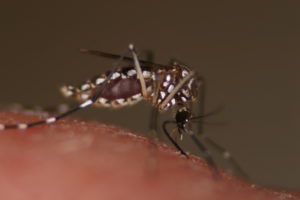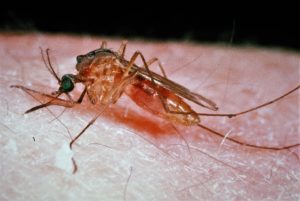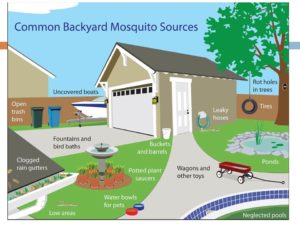West Nile case numbers lowest since 2012

- Writer: Adam Russell, 903-834-6191, adam.russell@ag.tamu.edu
- Contact: Mike Merchant, 972-952-9204, m-merchant@tamu.edu
DALLAS COUNTY – Cases of West Nile virus in Texas have been the lowest in years, and researchers may know why, according to Texas A&M AgriLife Extension Service experts.
Mike Merchant, Ph.D., AgriLife Extension entomologist, Dallas, said a publication by health officials in Dallas County may shed light on factors that contribute to outbreaks and help forecast outbreaks in the future.
There has been one case of West Nile in humans this year in Fort Worth, but Merchant said vector indexes used to measure the conditions under which the disease is spread are the lowest they’ve been in five years.
Mosquito numbers this year are normal to high, Merchant said, but the presence of the disease has remained low. A report by the Dallas County epidemiologist showed West Nile virus outbreaks correlate with weather conditions, and this season was not conducive to its production and spread.
Prime conditions

On the other hand, Merchant said conditions in 2012 were prime for spreading West Nile virus.
In 2012, nearly 400 cases of West Nile virus were reported in Dallas County alone, and 19 people died of the disease. The epidemic was so bad county officials resorted to spraying the entire county.
The paper, written by Dallas County epidemiologist Wendy Chung, Ph.D., and colleagues in 2013, explains the lower number of West Nile cases this summer, said Merchant.
Chung and colleagues charted the 2012 outbreak and found high infection rates of mosquitoes early in the summer, followed by a rapid increase in human cases.
Looking back over previous years and case numbers, Merchant said the researchers concluded that an unusually mild winter followed by rainfall patterns ideal for mosquito breeding in the spring followed by a very hot summer created ideal conditions for an outbreak.
“Mosquitoes breed faster when it’s hot, but also the virus multiplies faster at higher temperatures,” he said. “So, we had conditions for the worst year then. This year the heat didn’t really set in until the last month or so.”
Take precautions despite low case numbers
Sonja Swiger, Ph.D., AgriLife Extension entomologist, Stephenville, said the rest of the state has also experienced a lower number of West Nile cases this year.

Swiger reached out to the state medical entomologist and entomologists in Dallas and Harris counties and said the consensus is numbers are slow at this time but that may or may not predict the year.
Case numbers have been lower than each year prior, she said, but the virus can peak when conditions allow.
“If you look at the data from the years before 2012, one of the largest WNV outbreaks on record, the cases were minimal just the year prior,” she said. “Plus, a weather event could still occur at any time and change what is happening now. WNV season does not conclude until Nov. 1, and with two months left, we just cannot be positive of the future.”
Merchant said health officials in Dallas County have found West Nile-positive mosquitoes, but their numbers have been very low, especially when compared to 2012. While he doubts a major increase in transfers to humans will occur, people should take precautions to avoid mosquito bites.
“We still need to treat mosquitoes with respect and take proactive measures to avoid them, but we wanted to give some good West Nile news for a change,” he said.
For a comprehensive look at how to reduce mosquito populations around the home and protect against bites, go to AgriLife Extension’s Mosquito Safari.


